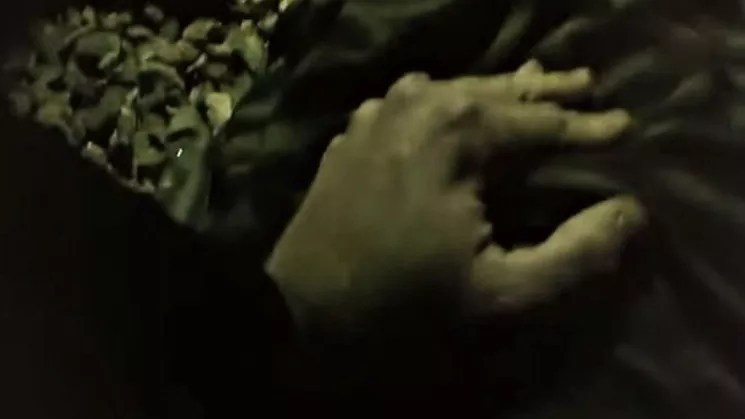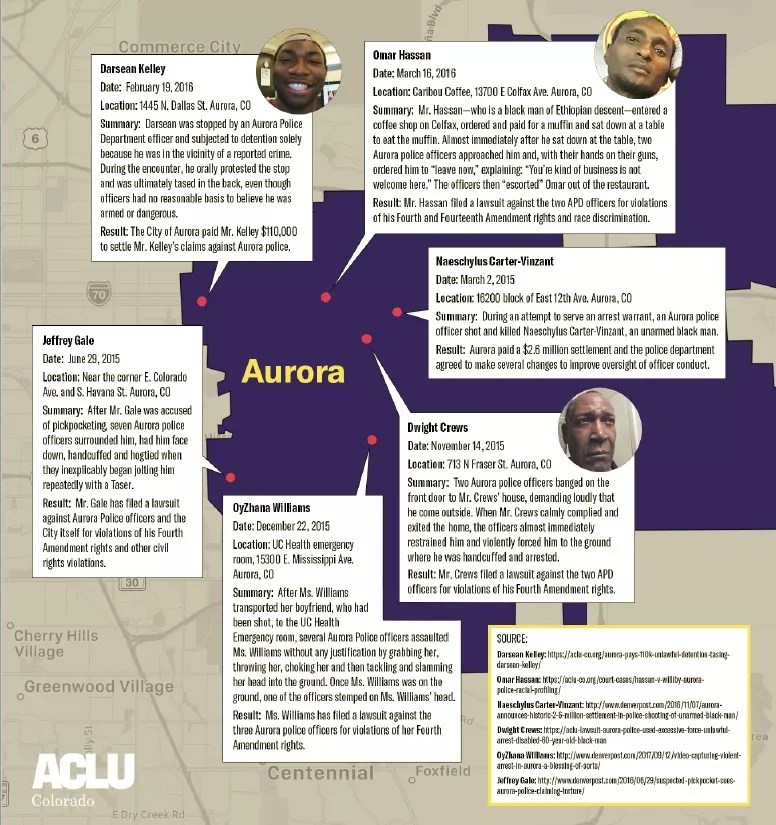
CBS4 via YouTube

Audio By Carbonatix
In “What Can Happen If You’re Black, Wear a Hoodie and Buy a Muffin in Aurora,” published in September, we told you about an American Civil Liberties Union of Colorado lawsuit filed on behalf of Omar Hassan, a man of Ethiopian descent who became an alleged victim of racial profiling when police ordered him to leave an Aurora coffee shop, apparently because of his appearance alone. Now the ACLU is suing two different Aurora police officers for roughing up Dwight Crews, another African-American, after he alerted them to his pet cat slipping out his front door. And while the stories are separate, ACLU of Colorado legal director Mark Silverstein sees unfortunate similarities.
“This is part of a disturbing string of incidents in which Aurora police are accused of abusing and violating the constitutional rights of people of color,” Silverstein says.
Indeed, Silverstein notes that his organization recently resolved a third case centering on questionable police conduct in Aurora pertaining to an African American man – Darsean Kelley. In December 2016, according to Silverstein, Kelley “was basically stopped for walking while black and then tased in the back while he was saying, ‘I know my rights.'” This past July, the City of Aurora agreed to pay a $110,000 settlement in the matter.
And that’s not all. An ACLU map pinpoints three other controversies involving the Aurora Police Department and people of color, including two covered in this space. In November 2016, Aurora ponied up $2.6 million to settle the fatal shooting of Naeschylus Vinzant by Aurora police officer Paul Jerothe the previous year. And this past September, we reported about a lawsuit filed by OyZhana Williams, who is suing three Aurora police officers over a 2015 incident during which she was roughed up and had her head stomped in the parking lot of a hospital where her boyfriend was being treated for a gunshot wound.
Here’s the graphic:

ACLU of Colorado
As for Crews, the lawsuit describes what happened during the early-morning hours of November 14, 2015.
After midnight, Crews prevented his stepdaughter’s husband from physically abusing her. His son-in-law, who is white, responded by calling the Aurora police and claiming that Crews had assaulted him and might be in possession of a gun.
Officers Steven Gerdjikian and Ryan Marker, the defendants in the suit, arrived at Crews’s home around 2 a.m., about an hour after the altercation. Moments later, they started banging on the front door and demanding that Crews step outside. “You’re going to get a warrant for your arrest if you don’t come down here to resolve this,” one officer is quoted as saying.
Crews, who is sixty years old and has back problems from wounds sustained during a car accident, made it to the front door from the home’s third floor, where he was watching television, and was immediately subjected to a physical search. While that was going on, his cat ventured outside, and when Crews pointed in the direction of the animal, the officers took him down to the ground, injuring him in the process.
One of the officers was wearing a body camera, and while it’s difficult to see precisely what happened in the recorded footage because of darkness, the audio tells a tale of its own. Screen it below:
Before long, Crews was taken into custody on suspicion of assault and resisting arrest, but neither charge stuck. A judge didn’t see enough evidence to support the resisting-arrest accusation, and a jury subsequently found him not guilty of assaulting his son-in-law because he had been acting to defend his stepdaughter.
Nonetheless, neither officer was disciplined for actions against Crews, as is acknowledged in an Aurora Police Department statement released after the lawsuit was filed. It reads:
The Aurora Police Department has recently been made aware of a lawsuit filed against two of our officers by Dwight Crews, an individual being represented by the ACLU of Colorado and a private law firm. The alleged incident took place nearly two years ago on November 14, 2015 at an Aurora residence. Mr. Crews never filed a complaint with the Aurora Police Department, and the City of Aurora only became aware of his accusations after his attorneys sent a letter of demand to the City on October 30, 2017.
The Aurora Police Department takes allegations of misconduct very seriously, and officers are required to maintain the high standard of conduct that is expected from members of our community. In addition, the Aurora Police Department strives for accountability of its officers and works hard within the community to promote transparency. This incident happened in November 2015, eight months after the appointment of Chief Metz. Under his leadership, the Aurora Police Department has undergone organizational changes specifically to foster transparency and trust in the community. One of the changes directly affected the manner in which complaints are received and handled via the Internal Affairs Bureau (IAB) and how use-of-force incidents are investigated, documented and reviewed by a Force Review Board (FRB).
With regard to this incident, which was captured on a body-worn camera, a use-of-force investigation was conducted by a supervisor, pursuant to the policy in effect two years ago, and the officers were found to have acted appropriately.
Due to active civil litigation, the Aurora Police Department is unable to comment any further on the matter at this time.
The reference to transparency in the statement strikes Silverstein as dubious. After all, he says, “we have not had the opportunity to see how the Aurora Police Department arrived at its decisions exonerating the conduct of the police officers either in this case or in the cases of Mr. Kelley and Mr. Hassan. Aurora refuses to disclose documents related to its investigations of alleged police misconduct even after those investigations are completed. Basically, Aurora says, ‘Trust us. We investigated our officers and they did nothing wrong.'”
But “the community wants to hear more than ‘Trust us,'” he continues. “They want to know, ‘How did you arrive at the decision that it’s okay to tase this man in the back? How did you decide it’s okay to tell a young black man that his kind of business isn’t welcome in a coffee shop? And, in this case, how did you arrive at your decision that what happened with Mr. Crews is okay?'”
In Silverstein’s opinion, “The Aurora Police Department really needs to take a good, hard, self-searching look at how its police officers are dealing with communities of color.”
Click to read Dwight Crews v. Steven Gerdjikian, et. al.